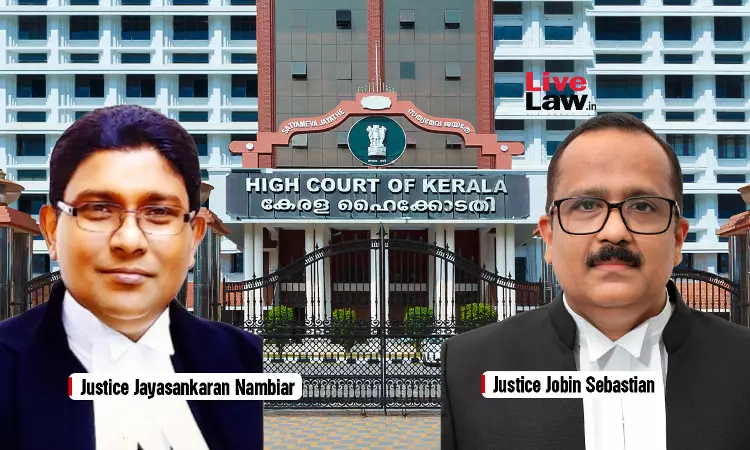- Home
- /
- High Courts
- /
- Kerala High Court
- /
- Kerala High Court Judges Visit...
Kerala High Court Judges Visit Human-Wildlife Conflict Zone In Kannur, Moot Voluntary Tribal Relocation & Crop Change
Anamika MJ
14 Aug 2025 11:42 AM IST
The Kerala High Court has urged the State government to adopt a “reimagined” and inter-departmental strategy to address escalating human–wildlife conflicts in Aaralam Farm, Kannur district, and Wayanad. A division bench comprising Justice Jayasankaran Nambiar and Justice Jobin Sebastian made the remarks during a hearing on Wednesday, after reviewing on-ground realities and...
The Kerala High Court has urged the State government to adopt a “reimagined” and inter-departmental strategy to address escalating human–wildlife conflicts in Aaralam Farm, Kannur district, and Wayanad.
A division bench comprising Justice Jayasankaran Nambiar and Justice Jobin Sebastian made the remarks during a hearing on Wednesday, after reviewing on-ground realities and hearing submissions from top State officials, including the Chief Secretary.
The bench disclosed that it had personally visited Aaralam Farm to gain first-hand insight into the crisis. It found that despite measures spanning a decade—including the construction of protective walls—wild animal incursions, especially by elephants, persisted. The geography of the area, with tribal settlements wedged between dense forest and cultivated farmland, was identified as a core vulnerability.
The court observed that these settlements are scattered rather than clustered, making them harder to defend, and contain “forest enclave” pockets that allow elephants and other wildlife to hide after breaching barriers.
It noted that even monkeys were becoming a recurring nuisance, pointing to the inadequacy of relying solely on physical walls as a deterrent.
One major suggestion from the bench was the voluntary relocation of tribal homesteads into the farm area, which benefits from better surveillance and protection.
The court emphasised that this would not mean displacing people from their land or livelihood, as they could continue agricultural work within the farm and be paid wages for their labour.
“Their lives are secured, so is their livelihood,” the bench said, noting that such relocation could help prevent casualties without severing communities from their income sources.
The Chief Secretary acknowledged that a “complete reimagining” was necessary. The State's revised plan proposes systematically phasing out crops that attract elephants—such as banana, pineapple, jackfruit, and cashew—and replacing them with “elephant-unfriendly” crops like ginger, turmeric, chilli, and cinnamon.
“We have to deprive the animals of the reason to enter,” the Chief Secretary explained, adding that Kerala's strong spice market could sustain livelihoods while reducing wildlife incursions. The plan also involves clearing dense undergrowth in tribal development areas to remove hiding spots for elephants, integrating this with the agricultural shift.
The bench highlighted chronic administrative hurdles, with the farm and tribal resettlement areas falling under different departments, leading to delays and disputes. It recommended placing both under a single administrative head.
The State informed the court that a Kerala Administrative Service officer had been appointed as Managing Director of the Farming Corporation, with full oversight of both areas' development and administration.
The bench differentiated Wayanad's challenge from Aaralam's, noting its crisscrossed forest and settlement pattern. Here, community-level vigilance through Janajagratha Samithis—first used during the COVID-19 pandemic—is playing a key role.
The court encouraged formalising this grassroots network, creating an organisational chart to define roles and responsibilities, and extending the model to other conflict-prone districts like Palakkad, Kasaragod, and Idukki.
Throughout the proceedings, the bench reiterated that it was not attempting to craft policy but to mediate between citizens and the government to remove bureaucratic roadblocks. “Ninety percent of the solution depends on understanding the problem,” the court noted. “Grave situations call for drastic measures and informed decisions,” it added.
The District Collector of Wayanad, District Collector of Kannur, Varun Dalia, IFS, DCF and Wildlife Warden, Wayanad, Sub Collector, Mananthwady were also present online during the hearing.
The matter will be reviewed on a weekly basis, and the State has been directed to file a report on the strategies adopted.
Case Title : Baiju Paul Mathews v State of Kerala and connected case
Case No : WP(C) 7858/ 2025 and connected case
Party in person.
Counsel for Respondents - T R Harikumar, Arjun Raghavan, Nirmal S, V Harish, Nagaraj Naryanan



